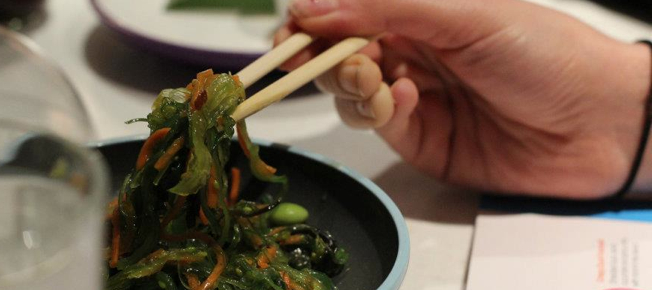I moved to Los Angeles about four years ago. In all that time, LA has proved to be a lot of things. Yes, there are a million blonde white girls who look exactly like me (and it seems like they snapped up all the agents already). Yes, there are images of fitness perfection everywhere and people really love the word “cleanse.” Yes, there’s no such thing as winter, to my great dismay. But most of all, people here care about their careers more than any other city I’ve lived in.
Granted, I haven’t lived very many places, and I have no reason to be surprised. Working in entertainment in LA takes a great deal of focus and drive. But I had no idea the level of scrutiny my own life choices would be subject to.
I had long ago decided that the LA lifestyle wasn’t something I would subscribe to completely. I moved down there with a grain of salt and an escape plan in mind. I wasn’t planning on scrabbling for infomercials or paying hundreds of dollars for “Agent-Meet Workshops”; really, my personal goals were to gain experience doing projects I was interested in and expanding my acting horizons. Because of this level of detachment, I hadn’t thought that the attitude of Los Angeles toward marriage would be any different than that of the rest of the country, where 20-something-year-old women are subject to the questions of their older counterparts: “Who are you dating? When will you settle down? When will you be married?” So, when I became engaged at 23 and set the wedding date for after I turned 25, I didn’t consider it unusual at all and was excited to wear a beautiful ring that would scream the happy news for me without me even having to open my mouth.
But man, the reactions I got! People acted as if I had decided to become a nun. Or join a cult. The ring on my finger became an instant magnet for attention, and not all of it was good.
Let me clarify: those who have known me for a while, and who know my fiancé, or are at least good enough friends with me that they feel as if they know him, didn’t have any comments to offer except “I’m so happy for you! It was only a matter of time!” Instead, it’s those who met me more recently, and who noticed the ring, who had less positive things to say. Things like, “Wait….you’re getting married? How old are you? Oh my god, you’re a baby! How do you even know what you want when you’re so young? What about your career? Do you want children right away? Wait…you don’t want to have children right away?!? Why get married so soon then? What about your career? Why are you settling down? What about your career? What’s the rush? For the love of GOD, what about your CAREER?!? THINK ABOUT YOUR CAREER, WOMAN!”
I was completely unprepared for this onslaught of questions. I got them from new coworkers, new acquaintances, and even had other comedians ask me these questions while I was working… a completely unsolicited barrage of opinions and judgment. I tried not to fall in the trap of explaining my life choices to a stranger, but the more I was exposed to it, the harder it got to not be defensive.
The fact was, I had never really thought about what a marriage would do to my career because I never felt the need to weigh “career vs. relationship.” I wasn’t planning on having children for at least five years. I wasn’t planning on being a stay-at-home wife. My fiancé is an encouraging and supportive partner. I had been in a relationship with this man for six years and was still able to pursue a career. Our relationship, and my love for him, has in no way been a detriment to that end. I’ll admit that if there was no one in my life, I would have been more engrossed in my job, but the situation I was in was what I had been looking for all along: a balance in my life, with love, passions, art, family, and career.
The thing that drove me over the edge was that other women were having the exact opposite problem that I was having. Women who were single, whether to concentrate on their jobs or simply because they hadn’t found the right person yet, were being examined and questioned for not doing the exact thing that I was about to do. Ladies just couldn’t win! I was also baffled that—given that there are so many different family structures and relationship choices in this modern age—there is anybody left to be surprised or seemingly personally offended by my somewhat conventional life choices.
Later, I discovered that one of my coworkers who questioned me so relentlessly was actually unsatisfied with her own relationship status. It made me realize that there’s usually more under the surface when people present their judgment, but I still don’t excuse those people. To me, if someone tells you about their relationship or family status, whether it’s “married with children,” “single mother/father,” “dating around (or sleeping around),” “gay,” “bi,” “straight,” or “polyamorous,” it is insufferably rude to respond with anything other than: “Oh, that’s cool.”
The plus side of all of this is that I have learned to gain some perspective on the whole concept of judgment. I realized that no matter what your choices, no matter how “normal” they might seem, someone somewhere is going to judge you for it. I’ve learned to not give a shit. I’ve resolved to become less judgmental myself. If someone goes on about something that someone else is doing and how “weird” it is, I just shrug my shoulders and say, “Well, if it works for them and it’s not hurting anybody…” Even if I’m uncomfortable with something, it doesn’t give me a pass to be a judgey little meanie about it.
Finally, this thought: Many people have many opinions and thoughts on marriage. I can’t speak to anyone else’s experience, but for me, marriage doesn’t mean a one-way ticket to Stepford wife-ness, nor is it the equivalent of a grave. It is not an excuse to stop growing and learning and exploring. The reason I cringe at the term “settling down” is because I never plan to, no matter what my relationship status. When my fiancé becomes my husband, we will both continue to be ever-changing and ever-expanding human beings. The beautiful part is that we choose to pursue that growth and learn those lessons with another person. My life and marriage will be, in the words of J.M. Barrie, “an awfully big adventure.”

Photo by Michelle White


